SINCE 2004
Zacks Dividend Strategy


WHY DIVIDENDS AND WHY ZACKS
Since the '30s, almost 40% of the stock market’s total return has come from dividends.
Stocks that pay dividends have historically had lower rates of volatility than those that do not, but the benefits offered to investors go far beyond risk management.
Even during market declines, dividends generate income and more reliable returns. Combined with preferred tax rates, overall what this represents for investors is an important source of returns and consistency in an environment challenged with slowing economic growth, bond market concerns, and a general scarcity in high-yield investments.
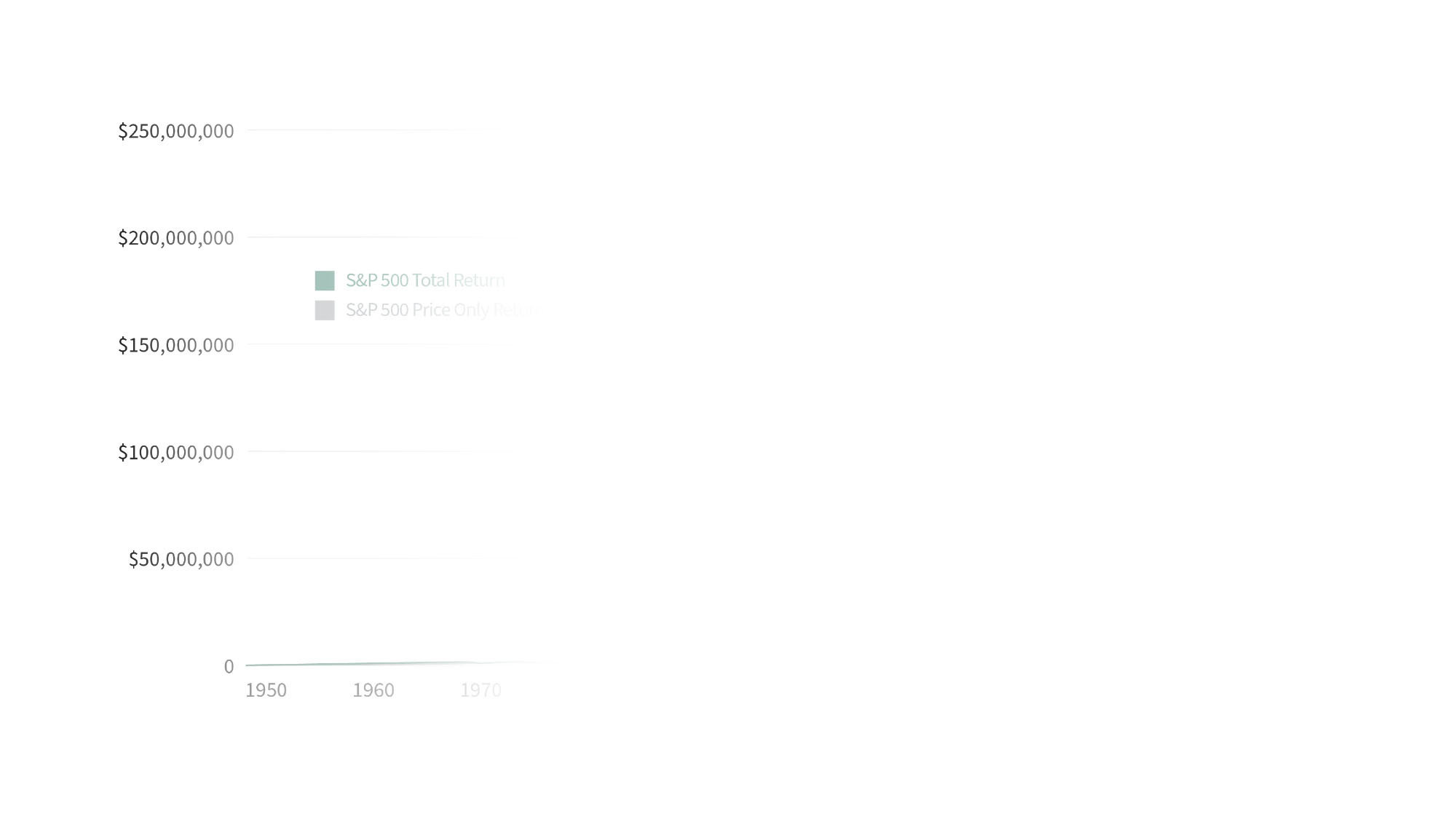
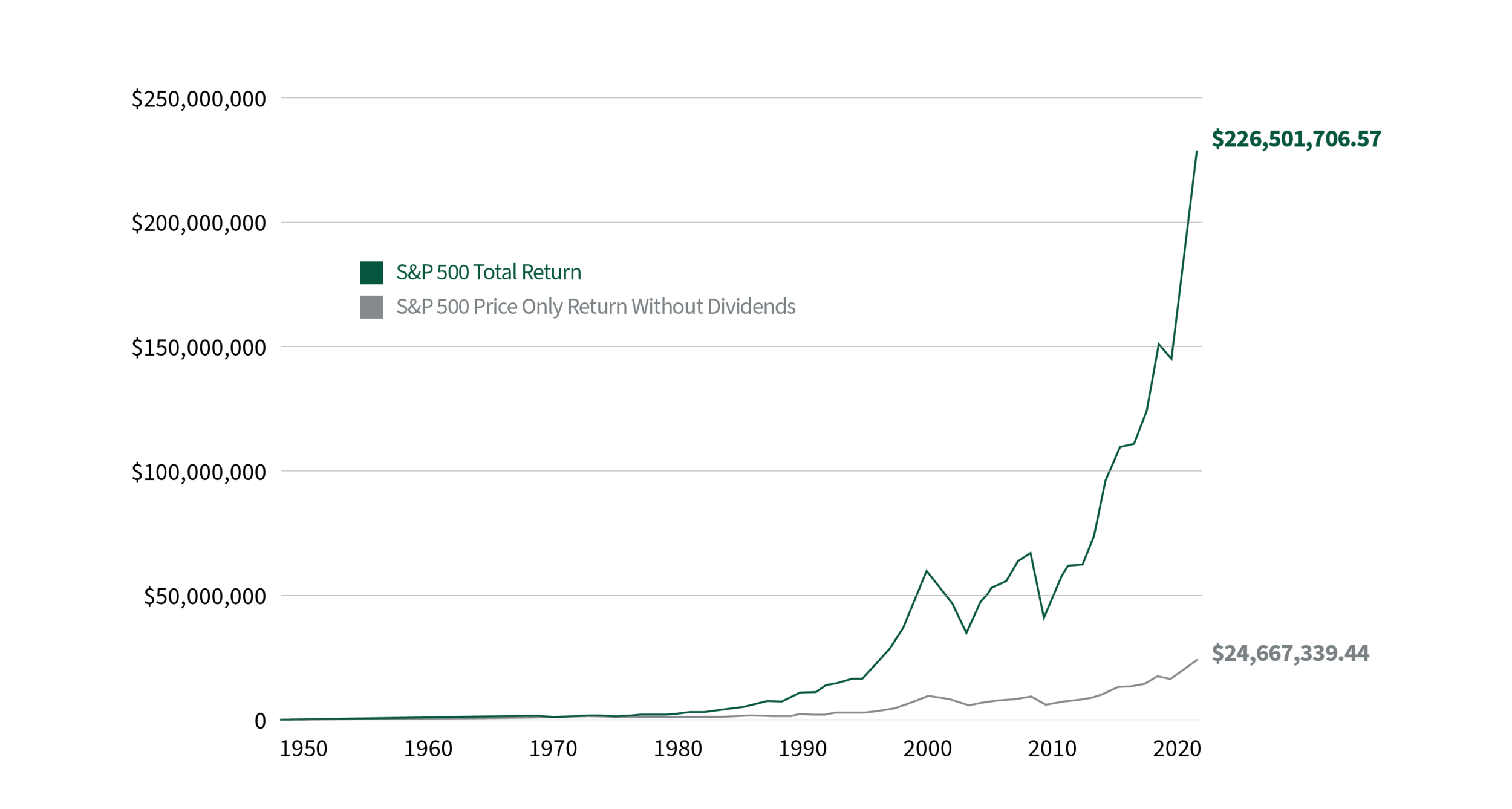
The above illustration represents $100,000 invested on January 1, 1950 through December 31, 2020. The dark green line shows the growth of the investment assuming dividends were reinvested. The resulting value equals $226,501,706.57 The gray line represents the value of the investment assuming all dividends were taken in cash and not reinvested. The same $100,000 investment results in an ending value of $24,667,339.44.
Source: Standard & Poors / Zacks Investment Research


Top Benefits of Dividends:
Approaching Dividends with an Analytical Perspective
Since the first innovations of our parent firm Zacks Investment Research in the 1970s, we have earned our standing as academics pursuing knowledge through exhaustive research. From that knowledge we have developed tools that push the industry forward and strategies that rise to the top of their peer groups. This is the perspective that led us to the Zacks Dividend Strategy.
Significant source of returns
Low relative volatility
Favorable tax treatment
Downside protection

OUR METHODOLOGY
The Three-Factor Alpha Model
Especially in the current climate, dividends can help bolster downside protection while contributing to total return, but capturing this opportunity requires a disciplined methodology.
For this reason, we’ve identified the most historically consistent signifiers of yield, sustainability and volatility to form the basis of our Three-Factor Alpha Model, which governs the security selection process for the Zacks Dividend Strategy. Using this model, we assign a daily numerical score, which equates to overall expected alpha and enables us to define buy and sell rules for the portfolio management team.
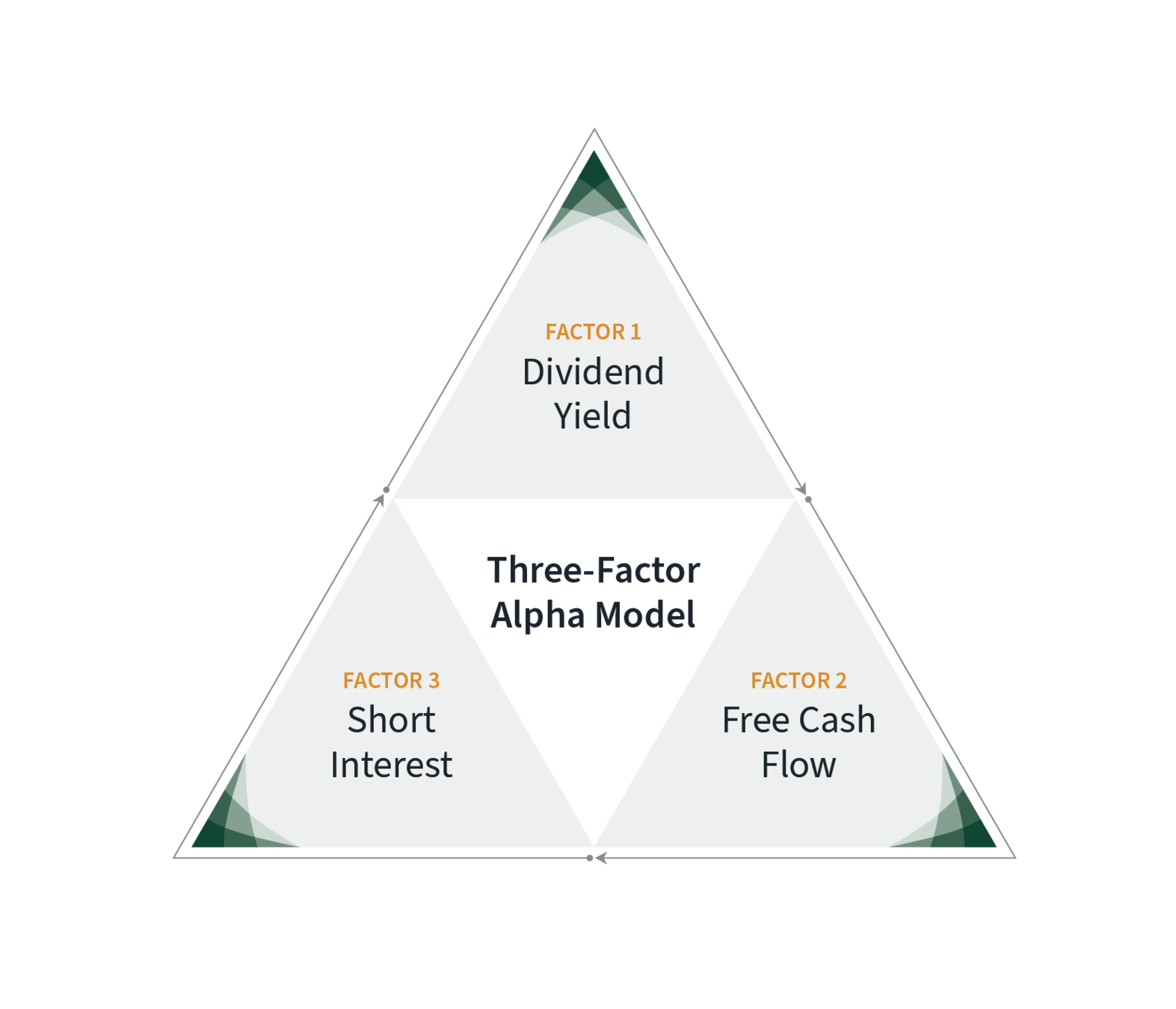
Is the company’s size, growth rate, and predictability of income strong relative to the market?
Does the company have relatively high cash flow?
Does the company have low levels of short interest?
OUR PROCESS
The Zacks Dividend Strategy Process
Universe Selection

Russell 1000 Value
Our process begins with the Zacks Dividend Strategy’s investable universe, the Russell 1000 Value Index.
Multi Factor Screen

Three-Factor Alpha Model
We ascribe three separate scores, one for each factor in our proprietary alpha model, to each company within this universe. The scores are relative to their peers and are updated every day.
OUR PROCESS
The Zacks Dividend Strategy Process
Stock Selection

Optimizer
We then use an optimizer to help maximize predicted returns, while reducing predicted risk.
OUR PROCESS
The Zacks Dividend Strategy Process
Portfolio Construction

Buy List
A buy/sell/hold list is compiled for the current portfolio.

Hold List

Sell List
OUR PROCESS
The Zacks Dividend Strategy Process
Daily Portfolio Review

Oversight
Our portfolio managers review the buy/sell/hold list and make adjustments to the portfolio as they see fit.
OUR PROCESS
The Zacks Dividend Strategy Process
On an ongoing basis, the Zacks Dividend Strategy seeks to outperform the Russell 1000 Value Index from which it’s been derived, while achieving a dividend yield that is significantly higher than the S&P 500 Index.
OUR PROCESS
The Zacks Dividend Strategy Process

ZACKS DIVIDEND STRATEGY:
Key Features
Since its inception in 2004, the Zacks Dividend Strategy has pursued its central objective with focus and consistency, achieving numerous performance awards as a result.
The Zacks Dividend Strategy seeks to outperform the Russell 1000 Value Index with less risk than the S&P 500. The strategy is designed to seek tax-efficient returns from both capital appreciation and dividends.
OBJECTIVE
High Yield: Has produced a substantially higher yield than the S&P 500

Characteristics
Low Volatility: Designed to capture the risk management advantages of dividend-yielding securities

Low Turnover: Managed with a strict buy/sell/hold discipline

Tax Efficient: Most capital gains are long-term, creating opportunities to reduce tax

“A high dividend-yielding strategy can help reduce volatility in a client portfolio and at the same time provide consistent and predictable returns.”
Mitch Zacks
Principal and Senior Portfolio Manager
The Zacks Dividend Strategy is part of the Morningstar Large Cap Value Universe. From 2005 to 2020, it has consistently placed in the top 10% of managers in this group.
Performance Ranking
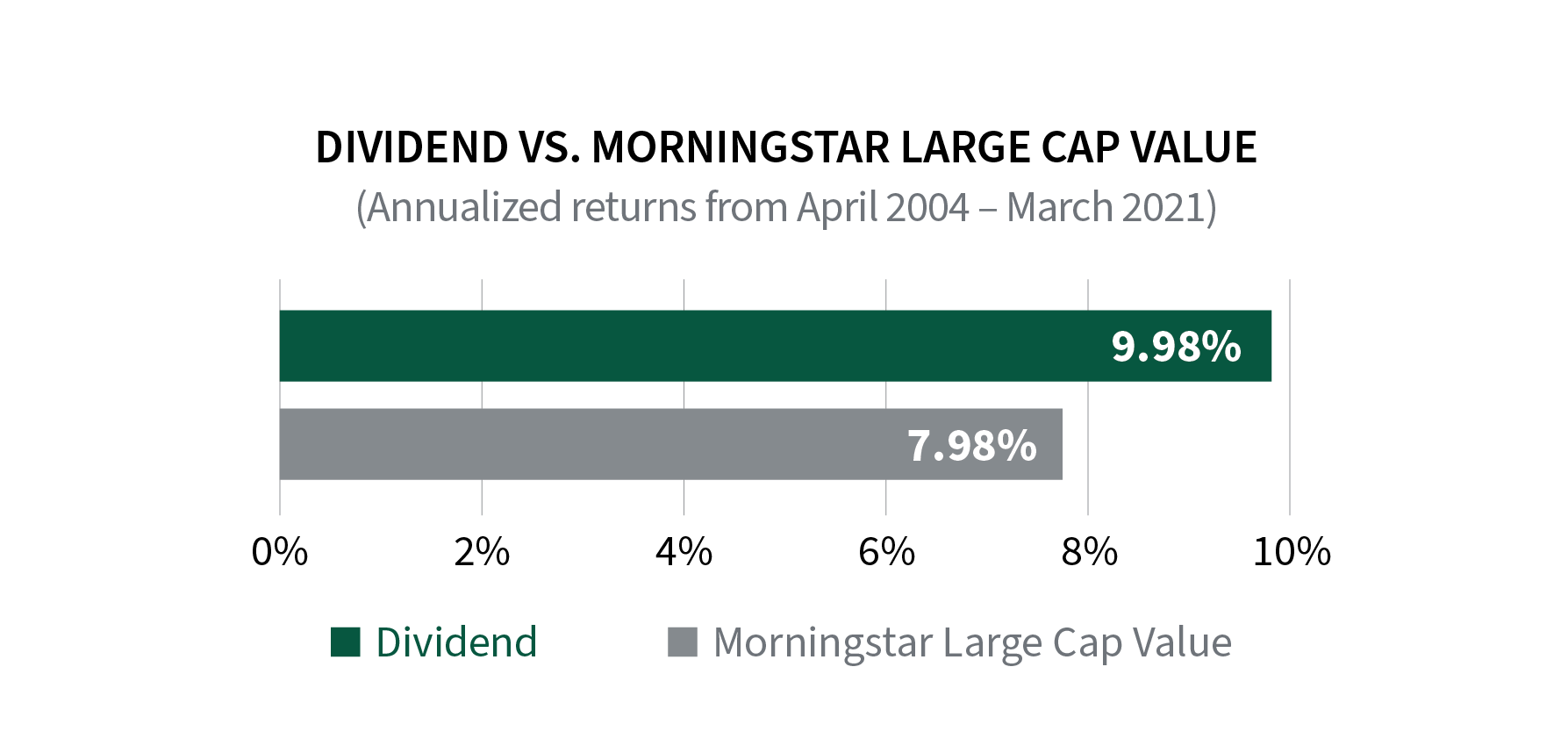
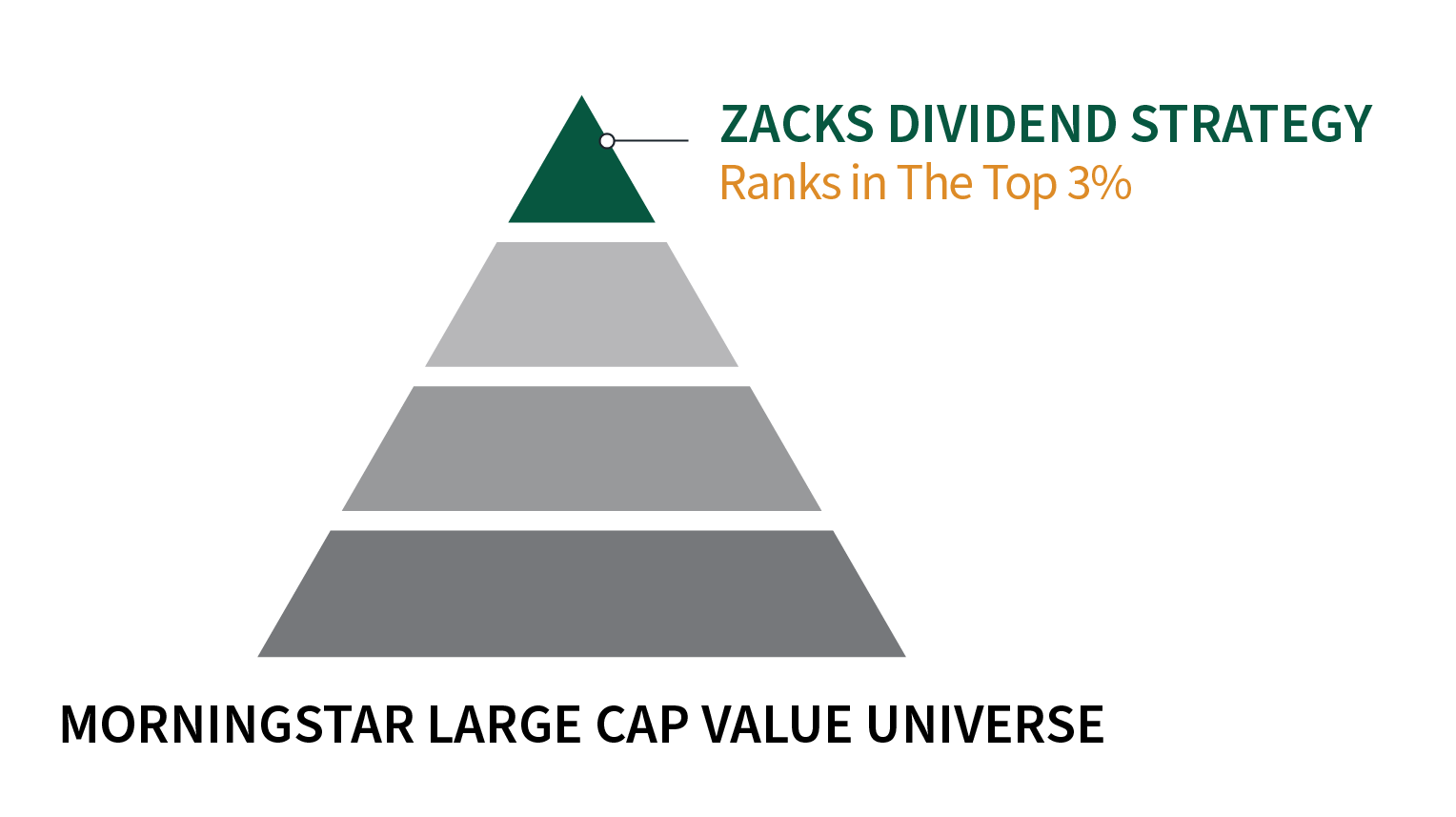
Please see disclosure at the end of this document.
The Zacks Dividend Strategy ranks in the top 3% out of 739 managers in the Morningstar Large Cap Value Universe.
Investors with significant investable assets often have multiple long-term priorities, segmented investment initiatives and other complexities. For those individuals, seeing the full benefit of the Zacks Dividend Strategy requires a tailored approach.
Managed Accounts
For this reason, we have made managed accounts available to qualifying investors whose goals align not only with the objectives of the Zacks Dividend Strategy, but also with the transparency, customization and liquidity possible only with managed accounts.
Managed accounts present a host of advantages over mutual funds and ETFs:
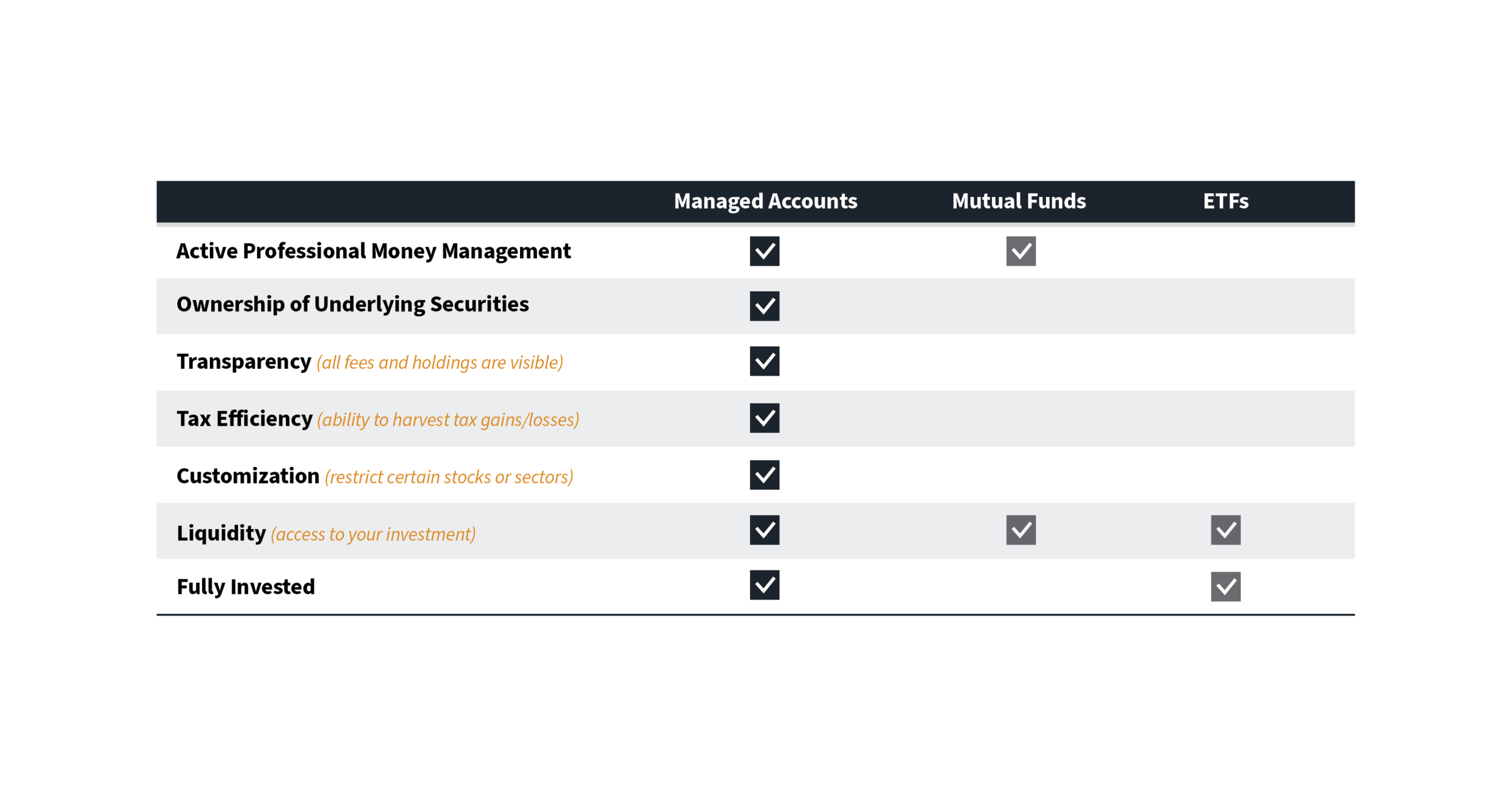

ZACKS DIVIDEND STRATEGY:
Portfolio Management Team
The professionals below represent the expertise, experience and scholarly research that have come to define Zacks Investment Management. The Dividend Strategy relies on these portfolio management, research and analysis teams, as well as the proprietary models and processes that they have developed.
Mitch Zacks is President of Zacks Investment Management, Senior Portfolio Manager,
a member of the Investment Policy Committee, and the firm’s primary expert on quantitative investing.
Mitch Zacks, MBA
BA, Economics, Yale University
MBA, Analytic Finance, University of Chicago
Principal and Senior Portfolio Manager
With over 22 years of investment experience, Mitch is principally involved in the engineering of the strategies that define Zacks, and he has personally developed many of the proprietary models implemented within those strategies.
Prior to joining Zacks, Mitch was an investment banking analyst with Lazard Frères. He has become widely recognized as an expert on corporate earnings, having written two books on quantitative investment strategies: “Ahead of the Market”, which details the Zacks method for spotting winning stocks early in any cycle, and “The Little Book of Stock Market Profits: The Best Strategies of All Time Made Better,” which was one of the top selling investment books in its publishing year. He has written a weekly column for the Chicago-Sun Times and currently produces a popular report, Mitch on the Markets.

Prasanth Sankar is Assistant Portfolio Manager for the Zacks Dividend, Mid Cap Core, and Small Cap Core Strategies. He brings a mathematics background to the portfolio management team and uses his expertise to develop and refine many of the firm’s proprietary models.
Prasanth Sankar, Ph.D.
BA, Physics, Indian Institute of Technology
PhD, Theoretical Physics, University of Illinois
Assistant Portfolio Manager
With 13 years of investment industry experience, Prasanth uses sophisticated and in-depth quantitative analytics to identify anomalies and to develop investment models that profit from them.

As a Data Scientist, Metin Akyol researches quantitative models through the analysis of big data. Research is foundational to the Zacks approach, and Metin’s is crucial to the management of the Zacks Dividend Strategy.
Metin Akyol, Ph.D., CFA
MSC, Economics, Goethe University Frankfurt, Germany
PhD, Economics with Honors, University of Technology in Darmstadt, Germany
CFA, The CFA Institute
Data Scientist
A Chartered Financial Analyst (CFA), Metin has also worked at the European Central Bank, the Center for European Economic Research, and the Deutsche Boerse-Eurex. He earned his doctorate in Economics with honors from the University of Technology in Darmstadt, Germany, and his research has been published in top journals. A recognized industry expert, he has presented at numerous conferences, has earned a best paper award, and has served as an adjunct professor at Trinity Christian College in Illinois.

FIRM OVERVIEW AND HISTORY
Zacks History and Legacy
To trace the history of Zacks is to draw a through-line from one of one of today’s largest independent equity research providers, through 40 years of pioneering studies, to Wall Street’s original think tank.
The Origins of Zacks Investment Research
In 1978, after receiving his doctorate from MIT, Len Zacks was the first to document the value of earnings estimate revisions within the stock selection process.
As time went on, his seminal article proved to be both accurate and influential. Zacks estimate revisions studies have become the most powerful indicator in forecasting material changes in earnings, and earnings have continued to be the most important fundamental factor affecting stock prices. Zacks Investment Management became synonymous with earnings estimate revisions analysis, and began originating concepts and innovations such as:
EPS surprise, now widely used in the investment industry
The Zacks Performance Rank, a proprietary stock-ranking model and the core of the Zacks Investment Philosophy
Numerous proprietary quantitative models
Zacks Investment Research is now one of the largest providers of independent research in the U.S., with a litany of Ph.D.s and other analysts involved in developing and refining models, assessing data and conducting research in order to form new insights into the investment process.



In 1992, Zacks Investment Management was established as a wholly-owned subsidiary of Zacks Investment Research. As a boutique wealth management firm, we apply the time-tested insights of our parent company to create models like the Zacks Dividend Strategy.
ZACKS INVESTMENT MANAGEMENT:
Born on Research
Since our inception, Zacks Investment Management has been dedicated to delivering results for our clients by seeking excess returns over standard benchmarks within a risk-controlled framework.
Ultimately, our active management approach and bottom-up fundamental stock selection process were built upon the very discoveries that changed the industry over 40 years ago, and have generated exceptional results ever since. Within the Zacks Dividend Strategy, we will continue to adhere to this discipline in all market cycles.
“The Zacks legacy was born on research and it has been proven through history. We’re an independent family business and to this day we’re proud to share the fruits of our expert insights for the benefit of our clients.”
Mitch Zacks
Principal and Senior Portfolio Manager

227 W. Monroe, Suite 4350, Chicago, IL 60606
Toll free. (888) 775-8351 | wholesale@zacks.com

Zacks Investment Management
Learn more at www.zacksim.com
Learn more at www.zacksim.com
Past performance is no guarantee of future results. All Investments carry a certain amount of risk.
This material is being provided for informational purposes only and nothing herein constitutes investment, legal, accounting or tax advice, or a recommendation to buy, sell or hold a security. No recommendation or advice is being given as to whether any investment or strategy is suitable for a particular investor. It should not be assumed that any investments in securities, companies, sectors or markets identified and described were or will be profitable. All information is current as of the date of herein and is subject to change without notice. Any views or opinions expressed may not reflect those of the firm as a whole.
There is no assurance that a separately managed account will achieve its investment objective. Separately managed accounts are subject to market risk, which is the possibility that the market values of securities owned will decline and that the value of the securities may therefore be less than what you paid for them. Accordingly, you can lose money investing in a separately managed account.
The Russell 1000 Value Index measures the performance of the large-cap value segment of the U.S. equity universe. It includes those Russell 1000 companies with lower price-to-book ratios and lower expected growth values. The Russell 1000 Value Index is constructed to provide a comprehensive and unbiased barometer for the large-cap value segment. The Index is completely reconstituted annually to ensure new and growing equities are included and that the represented companies continue to reflect value characteristics. The Russell 1000 Value Index assumes reinvestment of dividends but does not reflect advisory fees. An investor cannot invest directly in an index. The volatility of the benchmark may be materially different from the individual performance obtained by a specific investor.
The S&P 500 Index is a well-known, unmanaged index of the prices of 500 large-company common stocks, mainly blue-chip stocks, selected by Standard & Poor’s. The S&P 500 Index assumes reinvestment of dividends but does not reflect advisory fees. The volatility of the benchmark may be materially different from the individual performance obtained by a specific investor. An investor cannot invest directly in an index.
The Morningstar Universes used for comparative analysis are constructed by Morningstar (median performance) and data is provided to Zacks by Zephyr Style Advisor. The percentile ranking for each Zacks Strategy is based on the gross comparison for Zacks Strategies vs. the indicated universe rounded up to the nearest whole percentile. Other managers included in universe by Morningstar may exhibit style drift when compared to Zacks Investment Management portfolio. Neither Zacks Investment Management nor Zacks Investment Research has any affiliation with Morningstar. Neither Zacks Investment Management nor Zacks Investment Research had any influence of the process Morningstar used to determine this ranking. Rankings are as of 3/31/2021.
Other managers included in universe by Morningstar may exhibit style drift when compared to Zacks Investment Management portfolio. Neither Zacks Investment Management nor Zacks Investment Research has any affiliation with Morningstar. Neither Zacks Investment Management nor Zacks Investment Research had any influence of the process Morningstar used to determine this ranking.
ZIM Dividend Strategy
By AdvisorBranding
ZIM Dividend Strategy
Dividend Strategy
- 841



